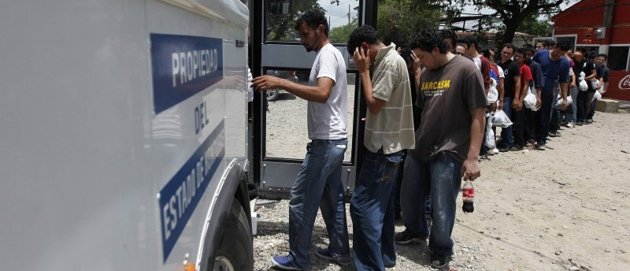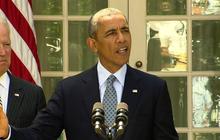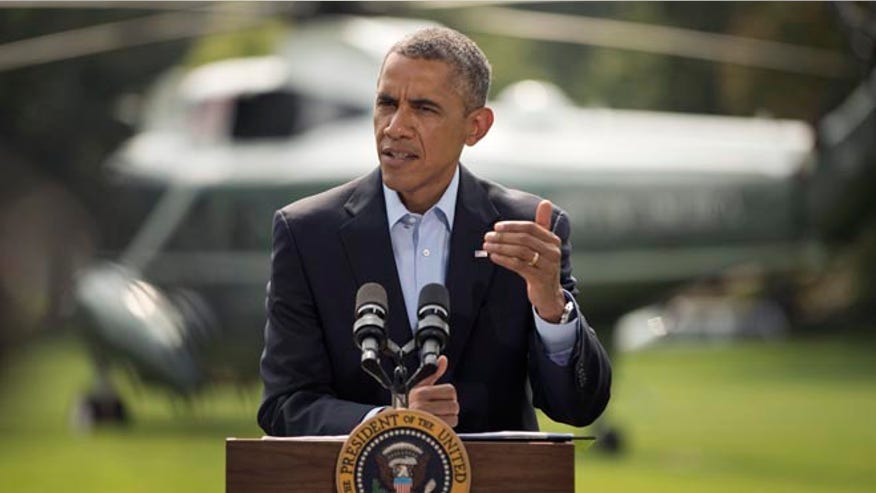By Mica Rosenberg and Jeff Mason
NEW YORK/WASHINGTON (Reuters) – As President Barack Obama prepares to announce major immigration policy changes, conservative attorney Kris Kobach is fighting a case in federal court he says has the potential to “torpedo” the president’s plans.
Kobach, the Republican secretary of state of Kansas, is an architect of laws in several states to combat illegal immigration. He is also the most prominent figure among a small group of lawyers working to punch legal holes in Obama’s immigration policies.
Obama has pledged to act alone in the face of congressional inaction on immigration reform, and an announcement could come in early September. Immigration advocates close to the White House are pressing for work permits and relief from deportation for up to 5 million people.
While opponents can’t craft a legal strategy until Obama lays out the specifics of his plan, Kobach is likely to be at the forefront of any battle.
“I think anybody inclined to challenge (Obama’s action) would either already know, or would ask around and find out, that Kobach is one of the main go-to guys,” said Michael Jung, a private lawyer in Dallas who has worked with Kobach.
Kobach, who is pursuing an existing lawsuit against the administration over a 2012 executive order Obama issued on immigration, said any new lawsuit would depend on what the administration rolled out.
But he made clear his distaste for unilateral White House action on immigration.
“In my opinion it really goes to the core of what America is about as a nation, we are a nation of laws,” Kobach told Reuters in an interview. “When you have this systematic violation of the law by official policy that’s really troubling. It just bothers me down to the very fiber of my being.”
Some legal experts say any legal challenges would have only slim chances of success. The biggest hurdle is proving “standing,” a requirement that the person bringing the suit show that they have been directly harmed.
LAWSUITS A DISTRACTION
But any lawsuits would provide fodder to Republicans, who have tried in recent months to paint Obama as a lawless president who is overstepping his authority.
They could also be a costly distraction for an administration struggling to keep up with myriad challenges at home and abroad. For example, a series of legal challenges to Obamacare, Obama’s 2010 signature healthcare overhaul, has at times frustrated the White House’s efforts to refocus attention on issues it wants to talk about.
Kobach, a telegenic 48-year-old with degrees from Harvard, Oxford and Yale universities, helped to draft a controversial 2010 Arizona law requiring state and local officials to check on the immigration status of individuals. Critics said the law encouraged racial profiling.
Kobach says he has made progress on surmounting the issue of “standing” in his existing case against the government.
That lawsuit challenges Obama’s 2012 decision to grant temporary deportation relief and work permits to young people brought to the United States illegally as children by their parents – a program known as Deferred Action for Childhood Arrivals, or DACA.
After DACA was announced, Chris Crane – head of a union representing 7,600 Immigration and Customs Enforcement employees and an outspoken critic of Obama’s immigration policies – spoke to Kobach about bringing a suit.
Crane also opposed earlier memos issued by John Morton, ICE’s former director, instructing agents to use “prosecutorial discretion” and release immigrants who pose no threat to national security in order to focus the agency’s limited resources on deporting criminals.
PROVING INJURY
Crane and nine other ICE officers sued as individuals, not as an entire union. They argued the presidential directives forced the law enforcement officers to violate a 1996 law requiring detention of immigrants if they are not entitled to be legally admitted to the United States.
A Texas judge dismissed the case last year, saying it was an employment matter that should be heard by a different court, but found the agents did have standing to sue.
“The central argument is that if you are put in a position where you have to choose between breaking the law and being punished by your superiors – that’s an injury,” Kobach said in a telephone interview from Kansas.
Kobach and the ICE agents have appealed the judge’s dismissal and a decision is expected next year.
“The Crane case has the potential to completely torpedo any administration plans to expand the number of aliens who get deferred action,” Kobach said. “If the ICE agents win, then the administration’s legal position collapses.”
Muzaffar Chishti from the Migration Policy Institute think tank said that while Kobach and the ICE agents made an interesting argument, case law was stacked against them and their appeal would be difficult to win.
White House spokesman Shawn Turner said the immigration measures the White House unveils in the coming weeks would be bulletproofed against “frivolous” lawsuits, but officials are well aware that opponents are gearing up for possible legal actions.
“At the end of the day, most likely what the lawyers are concluding is that this will really be more of a political question than a legal one,” said Michael Gottlieb, a former associate White House counsel to Obama and now a partner at Boies, Schiller & Flexner LLP in Washington.
In the ICE agents’ case, Kobach also argued that Mississippi had standing to sue because the state’s finances were strained by the presence of DACA recipients, but the judge rejected those claims.
“If a future presidential directive were structured similarly to DACA, then the two entities that would most likely have standing would be ICE agents and states,” Kobach said.
Mississippi is part of Kobach’s appeal and hopes to win standing on review. The state would have to review any new action by Obama to evaluate whether officials want to bring a new case, said Nicole Webb, a spokeswoman for the governor’s office.
POLARIZING FIGURE
Kobach’s interest in immigration issues began when he worked in the Justice Department in the Bush administration. Joining in 2001 shortly before the Sept. 11 attacks on the United States, he led efforts to prevent terrorists from exploiting gaps in the U.S. immigration system.
Kobach has also helped to draft more than 16 other immigration-related measures around the country including a contentious ordinance in Farmer’s Branch, Texas that banned illegal immigrants from renting houses and a law in Kansas requiring voters to bring birth certificates, U.S. passports or citizenship documents to the polls.
His immigration activism has been polarizing in Kansas.
Last year, 200 activists descended on his home to protest his immigration agenda, leaving shoes on his porch to represent family members who were deported.
Sulma Arias, director of the group Kansas People’s Action that organized the protest, said Kobach’s legal campaign against the government foments a broader anti-immigrant agenda. “I think there are negative implications of him continuing to fight this, even though I don’t think he can win,” Arias said.
Such lawsuits were intended to create a hostile climate for possible future steps the president could take on immigration reform, she said.
Kobach’s Republican opponent in the August primary race for Kansas’ secretary of state, criticized him for using the elected office to pursue his national agenda. But Kobach said he was working on the cases only in his spare time during evenings and weekends. He won that race and faces a Democratic challenger in November.
(Reporting by Mica Rosenberg and Jeff Mason, editing by Caren Bohan and Ross Colvin)
- Politics & Government
- Immigration Issues
- Barack Obama
- Kris Kobach
- immigration reform
- White House
Source Article from http://news.yahoo.com/kansas-lawyer-guy-battle-against-obama-immigration-050533298.html
Kansas lawyer is 'go to guy' in battle against Obama on immigration
http://news.yahoo.com/kansas-lawyer-guy-battle-against-obama-immigration-050533298.html
http://news.search.yahoo.com/news/rss?p=immigration
immigration – Yahoo News Search Results
immigration – Yahoo News Search Results




